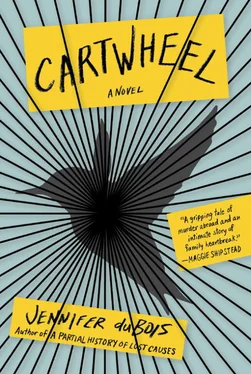Accordingly, in his examination of Lily, Eduardo could afford to be low-key. He spoke to her quietly, gently, and delivered only one serious jab. He needed only one.
“You say that you performed CPR on the victim when you found her body?”
“That’s right.”
“Lily, could you tell the panelists here the steps of CPR?”
She could not.
The impact statement came next. This was delivered by Mr. Kellers, eloquently and poignantly, the remaining members of his beautiful family making a tragic tableau behind the prosecution desk.
Then there was Anna: poised and self-contained; speaking crisply, with the terse composure of a law enforcement official, about all of Lily’s many fine qualities; and giving very good answers to all of Eduardo’s questions but one.
“I just didn’t think Lily would have wanted anyone to hear that message,” she said.
Eduardo tilted his head and furrowed his brows. “But why would you have worried about anyone else ever hearing it?”
Next came Sebastien LeCompte. He spoke tenderly of Lily when questioned by Ojeda, but even the mitigating assertions that he made about her—even the ones that Eduardo knew for a fact were true—wound up sounding somehow sneering and false. Perhaps this was due to stage fright. Perhaps it was due to the difficulty of entering an arena with one’s credibility already compromised, and the automatic inauthenticity that came with overcompensation (Eduardo remembered this from his own early attempts to network at law school, when he’d been so unpracticed and reluctant that he wound up coming across as even more transparently craven than his colleagues). Or perhaps, Eduardo thought, Sebastien LeCompte had actually forgotten how to mean anything. Perhaps he had never known.
In any case, there was no denying that Sebastien LeCompte had, like Lily, contributed to the obstruction of justice. Eduardo could have highlighted this fact in his questioning—he could have leaned on it, made Sebastien feel its threat, made the panelist judges see its import. But in the end Eduardo decided on a different approach, for its efficacy as much as for its humanity. At heart, after all, Eduardo did not believe Sebastien LeCompte was really dangerous to anybody, or that the mistakes he’d made were likely to be repeated outside of his own life. So the kid had lied to protect his girlfriend: This only showed that he had enough sense to see that she was guilty and enough loyalty to love her anyway. And, at any rate, it was abundantly clear that Sebastien LeCompte already had a prison.
And so instead of pursuing Sebastien’s deceitfulness, Eduardo chased his ignorance. What had Lily’s birthday party been like? he asked. Sebastien had not been there. Why had Sebastien not been there? Because he had not been invited. And how did Lily feel after having been fired? Sebastien did not know. And why didn’t Sebastien know? Because Lily had never discussed it with him.
It was in these faltering moments of admitting his own agnosticism—and in these moments alone—that Sebastien LeCompte finally sounded like he was telling the truth.
Last came Ignacio Toledo. It was hard for Eduardo to confidently guess how he was coming across to the judges; in certain moments he struck Eduardo as evidently self-serving, and Eduardo was not at all convinced that the panelist judges were convinced that he was telling the whole story. But they were even less convinced that Lily was, after all that they had heard. And—since Ignacio Toledo’s testimony involved a lot more self-recrimination than Lily’s did—perhaps it seemed to them intuitive to split the difference. Ignacio Toledo was sentenced to fifty years in prison. Lily Hayes was sentenced to twenty-five.
Afterward, the camera crews mobbed Lily Hayes’s family on the courthouse steps.
“Were you surprised at the outcome?” they asked.
And Andrew Hayes looked wearily at the camera and said that at this point in his life he was fairly sure that nothing could ever surprise him again.
Lily wrote to Sebastien only once during the trial. It was an odd letter, formal and paranoid and strangely anonymous, as though she’d written it without knowing who, if anyone, would ever read it. It was mostly about her parents: about how their visits were still at the center of her life, the thing that pinned her entire mind to the wall, but how every time they came she became obsessed with their leaving, consumed by thoughts of the minutes that had already passed, terrified of not feeling what she wanted to feel and not saying what she wanted to say during the time she had left with them. She wrote that she had to funnel her whole life, her whole secret heart, into these few moments, and that then they’d come and go and she’d spend the whole week worrying that she hadn’t gotten the visit right and vowing to do better the next time. But she didn’t, she said. She always found herself growing somehow abstracted, her attention half-deflected toward their departure. She wanted the visits to be something solid, she wrote, something she could fully get her arms around. But instead they were like everything else: They were diffuse, spurious things, like atoms, like seconds, like all the stuff you had to depend on but could never really trust.
The night of the sentencing, Eduardo took Maria out to dinner. At the restaurant, they were overly polite, like strangers who’d each been told that the other was freakishly given to offense. Eduardo knew he was being superstitious in not inviting anyone else out with them—he knew that he was trying to avoid an outburst of the sort that had happened after his promotion all those years ago. And though he was disappointed in his own childishness, he was far more disappointed that it did not seem to be working. Lately, their relationship had seemed to Eduardo like a coin spinning ever slower, far past the point at which you think it must surely, surely land.
That night, next to him in bed, Maria whispered a question into his ear when he was nearly asleep.
“Would you still love me if I killed someone?” she said.
The question crawled into Eduardo’s ear and hooked him out of his sleep, and it echoed within him for a moment, like something from a dream, before he realized it was real. “Did you say something?” he said.
“Well, would you?” Maria was on her side, head propped up on elbow, ear cupped in her hand. Eduardo had the impression that she had been staring at him for a while.
“What are you talking about?” He sat up. “That’s ridiculous. You’d never kill someone.”
“But would you love me if I did?”
“But you wouldn’t.” He turned on the bedside lamp. Maria looked up at him, her face owlish and expectant. She did not sit up. “You wouldn’t be yourself if you did.”
“You get so philosophical sometimes.”
“No, really. You wouldn’t. There would be no ‘you’ to love.”
“But what if you don’t know that? What if I already have killed someone? Would I still be me? And if I’m not me, who am I?”
“You haven’t killed anyone.”
“You’re right. But what if someday I will?”
“Don’t be morbid. You won’t. Do you need me to promise you you won’t so we can go to sleep?”
She smiled. “You don’t know I won’t. You don’t know me that well, really, after all.” Her face was strangely serene, and she seemed to be speaking almost to herself. She flipped onto her back and scrunched down into the sheets. “Somebody probably still loves that girl. Even if she did do it.”
“I’m sure somebody thinks they do,” Eduardo said testily. “And she did do it.”
“Somebody thought they knew her, too.”
“That I don’t doubt.” Suddenly, Eduardo had the sensation that he had been in this moment for as long as he could remember—not this exact conversation, perhaps, but in some version thereof, some dialogue in which Maria wanted something from him that he could not, and would never be able to, discern. She knew—she must know—that he would have given her anything she needed. Not telling him what she needed was her way of forcing him to fail her, which she knew—she must know—was the most hurtful thing she could do to him. Eduardo could see this kind of moment stretch out forever around him. It was ahead of him and behind him. It was beyond him and within him. It was, perhaps, the dark matter of the universe, and all the astronomers could stop looking.
Читать дальше












